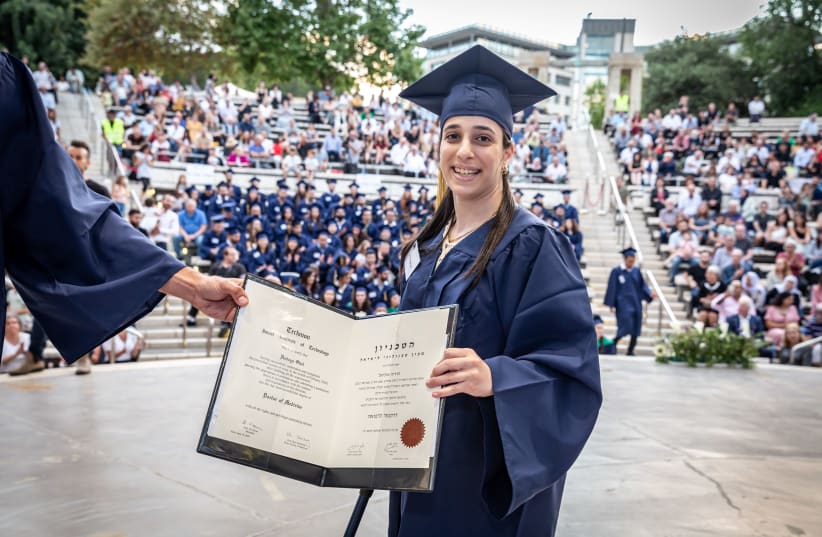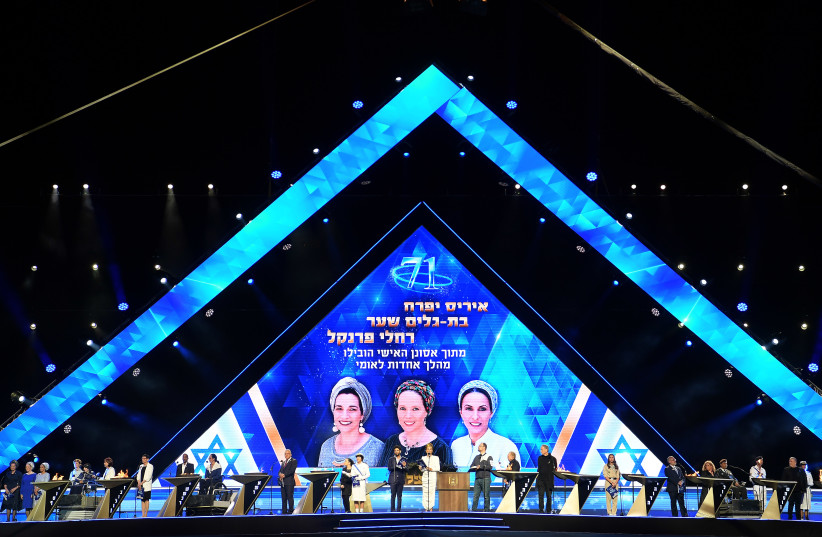If you ask Dr. Hodaya Oliel if she feels like she made history when she received her medical degree from the Technion and became the first doctor in Israel with cerebral palsy, she will reply, “No.”
“I don’t see myself that way. I’m just a regular doctor, as I’ve dreamt of becoming since I was a small child,” replies Oliel, currently a resident in the Pediatrics Bet department at the Shamir Medical Center (Assaf Harofeh), which is run by Prof. Michael Goldman. “It’s just that my difficulty is very visible, whereas the challenges lots of other people have to overcome might not be so obvious.
“Everyone needs to live with the lot they were given, and not give up on their dreams when the going gets tough. These dreams are worth fighting for. There were so many moments when I felt like giving up, but my dream was too important, so I kept trudging through the hard times. Reaching my goal was what kept me going.”
Oliel, 30, was born prematurely at only 27 weeks, when her mother’s water broke. After she was born, she stayed three months in the NICU. When she was six months old, she was diagnosed with cerebral palsy, which led to loss of motor function in her legs, but thankfully she did not have any cognitive impairment.
“I always wanted to be a doctor. There was never a time that this wasn’t crystal clear to me,” Oliel recalls.
“Every time I had to undergo surgery when I was a child or teen, I would say to myself, ‘I have to keep coming back to the hospital because God wants me to know what it’s like to be a child who is hospitalized.’ It was never easy, but I remember being so curious about everything I saw, even the operating room. These experiences are what spurred me to succeed in high school, and while I was studying for my psychometric exam. I didn’t make any backup plans for if I didn’t succeed. That was not an option.”
When she was four-years-old, Oliel began going to a regular kindergarten, and later attended Shachar, a national religious school in Ashdod.
“All of my extended family lives in Ashdod – I have a brother who is three years older than me, and a sister who is two years younger. When we were kids, my mother made sure that they weren’t given more chores at home than I was, so that they wouldn’t feel resentful toward me. This was really wise of her, and to this day my siblings and I have a wonderful and loving relationship.”
What was it like to be a kid with CP?
“It wasn’t great – especially not socially. In elementary school, I barely had any friends – maybe one or two. It was awful. I underwent five surgeries between the ages of five and 15, and after the second surgery, I was ostracized by the kids in my class for an entire year. So, in the end, I was actually happy that I had to stay home after the surgery, so I wouldn’t have to go to school and suffer the humiliation of being socially ostracized.
“To make things even worse, I had to have an aide follow me around all day at school, so you can imagine how all the other kids reacted to that. They looked at me like I was an alien. I was extraordinarily lucky, however, that my siblings were so supportive and would help me boost my self-esteem. I just couldn’t wait for elementary school to end so I could move to a new school and make a fresh start. I made a pledge to myself that I would do everything in my power to have a great social life at my new school.”
And Oliel was right. When she began her studies at the religious science high school in Ashdod, her social status improved immensely.
“I made the decision not to have an aide anymore, so my dad would walk with me to my first class in the morning, then my sister started going with me. When I began walking with a crutch, I was finally able to walk on my own, which was amazing.”
One of the most momentous experiences that helped Oliel integrate socially was an oral exam in Torah studies in the seventh grade.
“A few girls asked me if I wanted to study for the test with them,” she recalls. “I had no idea how you study for a test with other people, so I studied the material really well ahead of time, and then joined them. At some point, I realized that they were reading me the material, because they thought I needed help learning, that I was cognitively impaired. In the end, I got 107 on the test, and they both got around 70. From that moment on, the entire class realized that I was far from cognitively impaired, and they would fight among each other for the chance to study with me. At one point, someone even put together a spreadsheet so everyone could have a turn studying with me.”
After graduating from high school, Oliel chose to do her national service as a teacher at Asif, the school in the very same hospital where she’d spent a good chunk of her childhood.
“I worked mainly with CP patients,” Oliel explains. “When I had been hospitalized there as a kid, I was encouraged to join in on the activities with the kids who learned in that school. That’s why it was so meaningful for me to do my national service there.”
After completing her service, Oliel began preparing for her psychometric exam. She did really well on the test and was accepted to the Technion in Haifa in 2011. At this point, Oliel hunkered down in her studies in an effort to achieve her next goal: becoming a medical doctor.
“It was a very challenging transition,” she recalls with a smile. “Up until then, I’d lived at home with my parents, and all of a sudden I was far away, without any help. Granted, I was a very independent person, but there were so many things I didn’t know how to do yet, or that took me a really long time to do, and each day I would encounter a new difficulty, and who knows if there was going to be somebody nearby who could help me. In short, that first year was horrible, but I knew that I had to push on, and that I would figure out a way to get by.”
Where did you find the strength to get through that period?
“I told myself that we only get one life to live, and the most important thing was to do something that makes me happy. I wanted more than anything else in the world to become a pediatrician. That was the only thing I could think about. I didn’t always have someone to guide or support me, but I knew that if I was just a little more stubborn, and stuck it out through the tough times, I would succeed. That was how I was able to jump over each hurdle. I’m also a big believer in good karma – that when you help a person, you too will receive help from someone when you need it.”
In February 2019, Oliel began her year of residency at Kaplan Hospital, and at the end of her studies, she uploaded a post to Facebook that went viral: “I’m sending hugs to everyone who is in my position and thinks they don’t stand a chance. You do, but that doesn’t mean things will be easy. It just means that you need to keep breathing, give yourself daily boosts of confidence and believe that tomorrow might be a better day.”
“Throughout my years in college, I’d been uploading posts, but this particular post caught the eye of [journalist] Sivan Rahav-Meir, who invited me to come for an interview with her. This was my first step toward becoming well-known,” Oliel says. “I never imagined so many people would be interested in my story.”
That same year, Oliel was chosen by Israel’s Ministerial Committee for Symbols and Ceremonies to light a torch at Israel’s 71st Independence Day ceremony. To this day, she is still flabbergasted that she was chosen.
“I remember that during rehearsals for the ceremony, I had a lot of fun with my friends, but then when the actual night arrived, I was so nervous I almost began hyperventilating. I was so scared that I would mess up my lines,” Oliel recalls. “I felt like I wasn’t going to succeed in getting the words out of my mouth, it was so intense. I was hoping so much that I wouldn’t make a fool of myself. It was one of the most exciting moments of my life. I still can’t believe that I was part of the ceremony.”
What was your med school graduation ceremony like?
“Well, it kept getting delayed because of corona, but it was so exciting and emotional, and was truly a symbolic rite of passage. It was also so nice to see everyone again. I really love the Technion and truly appreciate everyone there, many of whom are good people who helped me overcome all the difficulties I faced. I do not take any of this for granted for even one second. There were so many hurdles along the way to receiving my degree, and I cannot believe that I succeeded in overcoming them all. Because of all this, participating in that ceremony was so incredibly meaningful for me.”
Now that Oliel is doing her residency at Assaf Harofeh, where she’d spent so much time during her formative years, she feels like she’s achieving another layer of closure.
“It is so meaningful for me to work as a doctor where I spent so much time as a patient – even if it was in the department across the hall. It’s like a dream come true.”
Do you receive a lot of messages from parents of children with CP?
“Yes, all the time. Ever since I participated in the Independence Day ceremony, the number has risen dramatically. I don’t always have time to respond, since my hours in the hospital working as a resident are so long, but I do try to write back to everyone. But seeing how many people I can help makes me feel like it was worth it all the times I experienced hardship.”
What are your professional aspirations?
“I plan on specializing in pediatric neurology.”
Translated by Hannah Hochner.

